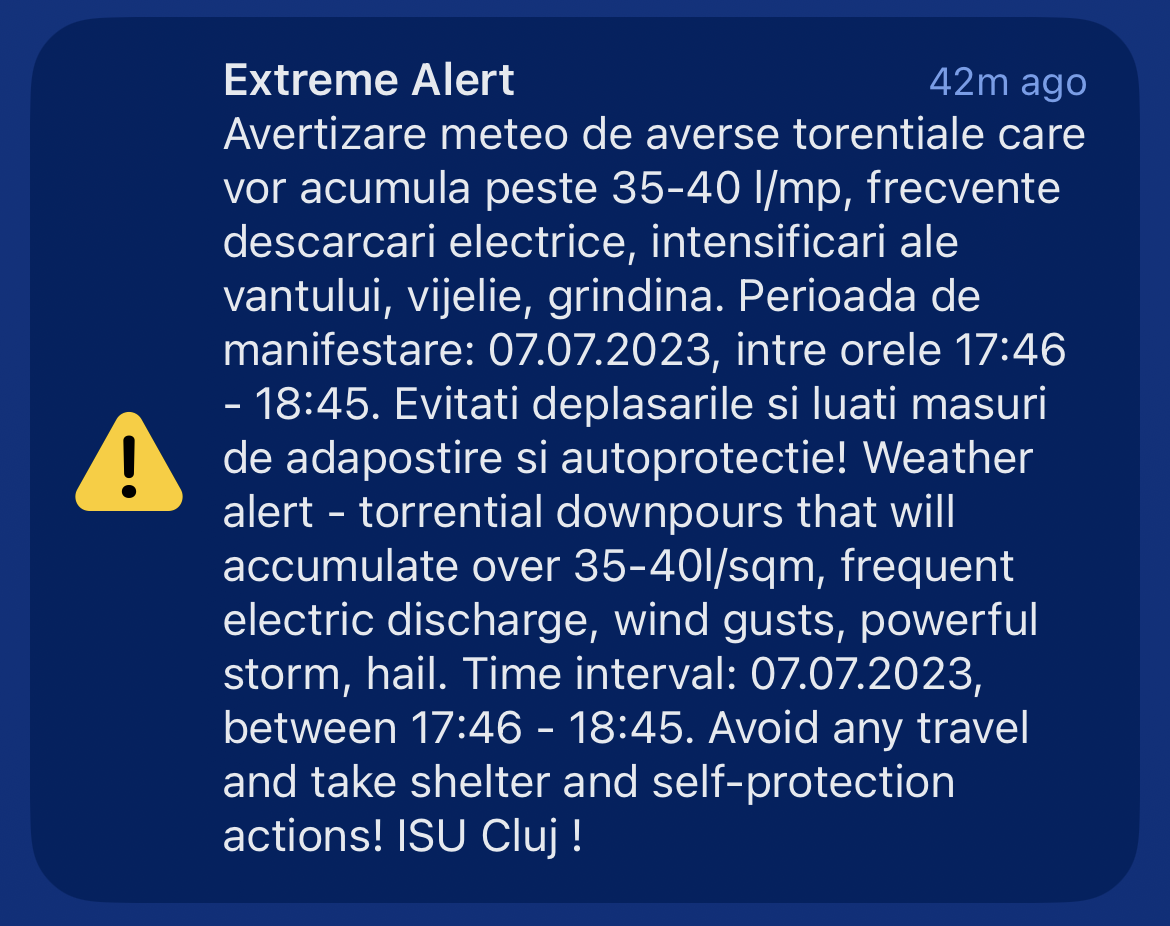The Emergency Alert Broadcast system, RO-Alert, implemented by the Inspectorate for Emergency Situations (ISU) in Romania, has come under scrutiny for its excessive use during situations of unfavourable weather conditions. Concerns have been raised regarding the effectiveness of the system, as people may be inclined to turn off the alerts due to the issuance of the alerts for seemingly small, non-life threatening events.
The RO-Alert system, designed to inform citizens about emergencies, operates on three levels: Extreme, Missing Child, and Severe Alert. However, a series of incidents involving the issuance of Extreme Alerts during minor weather events, especially compared to other countries who use the alert system, has raised eyebrows among the public. On July 7th 2023, some heavy rain accompanied by thunder and lightning triggered the highest level of alert, leading to questions about the system's appropriateness and the potential desensitisation of the population.

One individual expressed his concerns about this situation in a post on Facebook, alluding to the fable of “Ionica si Lupul.” (The boy who cried wolf). His post highlighted a recent incident where an alarm sound startled shoppers in a supermarket, only to realise it was a Ro-Alert emanating from someone's pocket.
“People were visibly nervous as they hastily dismissed the notification without even reading it,” his post read. “Thankfully, it turned out to be just another Ro-Alert. It's fortunate that nothing serious happened, but this mentality has been fostered due to the excessive issuance of alerts for trivial occurrences that often don't even affect the area where they are received. I hope the day doesn't come when a genuine emergency arises, and people ignore it because they receive too many senseless alerts.”
The Real Risks
The post resonated with many, reflecting a growing sentiment among the public regarding the diminishing significance of the RO-Alert system. Some individuals have already resorted to deactivating the notification system due to the excessive and seemingly unnecessary alerts they receive.
The effectiveness of the RO-Alert system lies in its ability to promptly reach and inform citizens during critical situations. However, the misuse of the system for minor weather events risks undermining its purpose and potentially endangering lives when a legitimate emergency arises. As such, it is crucial for the Inspectorate for Emergency Situations to review and revise their protocols to ensure the RO-Alert system is employed judiciously.
Comparatively, other countries, such as the United States, have successfully implemented similar emergency alert systems. The U.S. utilises the Wireless Emergency Alerts (WEA) system, which employs a tiered approach similar to RO-Alert, with different levels of alerts for different types of emergencies. However, the system in the U.S. is carefully calibrated to issue alerts only for significant and life-threatening situations, such as severe weather events, imminent threats, or AMBER alerts for missing children.
The U.S. WEA system has been widely regarded as an effective means of alerting the public during emergencies, ensuring that people take the alerts seriously and respond accordingly. By using a targeted and selective approach, the U.S. system has managed to maintain the trust and attentiveness of its citizens, maximizing the effectiveness of emergency notifications.
With a war taking place next to Romania in bordering Ukraine, and the increased risks that a nuclear incident could occur at the Zaporizhzhia Nuclear Power Plant due to the conflict, it's more important than ever that the system for emergency alerts is respective and relevant to all citizens.
Striking a balance
In an era where effective emergency communication is of paramount importance, striking the right balance between providing vital information and avoiding “alert fatigue” becomes essential. Failure to do so may result in citizens disregarding critical alerts, jeopardising their own safety and the effectiveness of the emergency notification system as a whole.



